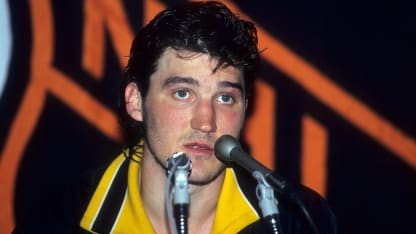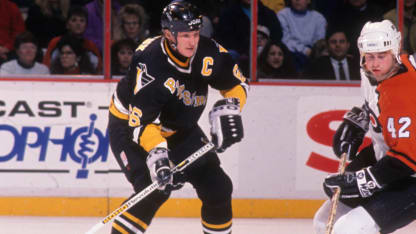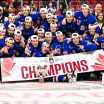Lemieux return from cancer 30 years ago today recalled as 'amazing feat'
Receiving standing ovation from Flyers fans before 1993 game among Penguins icon's greatest moments
Lemieux returns following cancer treatment in 1993.
The Pittsburgh Penguins center won the
Stanley Cup
and
Conn Smythe Trophy
as playoff most valuable player twice each; won the
Hart Trophy
, awarded to the regular-season NHL MVP, three times; and the
Art Ross Trophy
, which goes to the leading scorer each season, six times, among other accolades.
He finished his career with 1,723 points (690 goals, 1,033 assists) in 915 games for an astonishing average of 1.88 points per game. He ranks eighth all time in points, despite more than 800 fewer games played than four of the players above him.
He was inducted into the Hockey Hall of Fame in 1997 and is considered one of the greatest players in NHL history.
But if you wanted to point to what he did
March 2, 1993,
as his greatest accomplishment, few would argue with you.
He began the day in Pittsburgh, receiving treatment for cancer. He finished it in Philadelphia, scoring a goal in his first NHL game in more than two months.
Three decades later, those who were around Lemieux at that time still marvel at what might have been Super Mario's most memorable moment.
NHL.com spoke to several people involved in that game for an oral history of Lemieux's incredible comeback.

© B Bennett/Getty Images
On Jan. 12, 1993, seven days since his most recent game, Lemieux held a press conference in Pittsburgh to announce he had been diagnosed with Hodgkin's lymphoma, a type of cancer that affects the immune system.
At the time, he led the NHL with 104 points (39 goals, 65 assists) in 40 games, his eighth season with at least 100 points since his NHL debut in 1984-85.
"It is scary," Lemieux said. "Any time you hear the word cancer ... I went back home after I saw Dr. Charles] Burke and Dr. [Steve
When Lemieux took the ice for warmups, the only noticeable difference was the black turtleneck under his No. 66 jersey.*
Kjell Samuelsson: "The thing I remember was he lost his hair on the back of his head from the treatment, and he had a turtleneck on when he played from the treatment because of the marks he got on his skin from the radiation. You just looked at him and said, 'Holy cow, you're going to play hockey?'"
Recchi: "You give him a tap and say, 'Hey, how are you doing, it's awesome you're back.' And he has that big smile on his face. You just know he was so happy to be back and it was just great to see."
Steigerwald: "I don't think any of us were necessarily counting on him returning before the end of the season in the way that he did. That was probably what was most amazing. It wasn't like he had this five-week period of practicing or getting himself ready to play again."
Bowman: "He wanted to get back in. … It was an amazing feat that he was able to come back without a lot [of practice time]. But he'd been used to doing that, coming in and just playing games. He wasn't a guy that was regularly practicing. … We just played him. He was pretty well his own guy. He knew how long he could stay on the ice, and that was the kind of player he was."
Tocchet: "You should have seen the dressing room. There's not too many moments in my life where I just see an electrified room where everybody just glowed."
Brind'Amour: "When he showed up and you saw him in warmup, we were like, 'All right, now we know what we're facing.' Because even though he'd been out forever and going through all that, you kind of just knew. He's still the best player."

© B Bennett/Getty Images
While Lemieux skated off two months of rust during warmup, the fans in Philadelphia understood the enormity of what they were seeing and gave Lemieux a long, loud ovation prior to the national anthem.
Kjell Samuelsson: "You never expected that at all. I played against Philadelphia, and I played with Philadelphia, which I loved. They don't appreciate any opponents at all, which is good, I think. But that was unbelievable."
Recchi: "It was incredible. And no, it doesn't surprise me because people are genuine, and they care. Everybody's probably been touched with something in their lives with something like that. For Mario to come back and be able to play, just appreciation for what he's done for his career. Fans are fans. They're probably booing him during the game when he scored. But just to have that appreciation for him, it was just a great moment to be in and just to see that energy and that excitement that he was back playing hockey and doing what he loves to do."
Brind'Amour: "Whatever you want to say about Philadelphia fans, in my opinion, they're the best fans in that they'll give it to you if they don't like you or if you're not playing well. But they understand the moment and they understood that we're going to hate this guy after the fact but for what he's gone through, we're going to appreciate that because it needed to be appreciated, and they understand that."
Himes: "I've worked for the Penguins for 45 years and with five Cups I've got a lot of memories. But when Mario went out on the ice, the ovation that he got from the Philadelphia fans gave me goosebumps. The Penguins and Flyers were never best of friends. But the fact that the fans there had such a great appreciation for what he had overcome and to be there that night and to play in the game transcended the cross-state rivalry that the two teams had. It was amazing. It was really amazing. They didn't just clap. They stood, a standing ovation for what seemed to be the longest time, and that's one of the things I'll remember always."
Joe Mullen, Penguins teammate (from NHL Centennial Memories): "I think that was probably the biggest surprise, the ovation. Especially being in Philly, that the fans were great to give him that type of ovation. Then Mario went out and showed he deserved it."
The Flyers took a 3-1 lead after one period, but Lemieux became Lemieux at 1:54 of the second period. Samuelsson fell as he skated into left face-off circle and moved the puck to Lemieux on the wall. He slowly skated toward the goal near the bottom of the circle. With Tocchet camped in front of Flyers goalie Dominic Roussel, Lemieux's low wrist shot from a sharp angle went under Roussel's right pad.
Recchi: "Everything changes when Mario is playing. It's a whole other level. We didn't know what to expect, he's been off for a few months, he's been getting treatment. What do you expect? But then when you get out there and he doesn't look like he's missed a beat. We're like, 'We're in for a long night here. We've got to do the best we can and try to keep him to a minimum.' And that's all you can do with guys like that, it's just trying to keep them to a minimum as best you can."
Roussel (from "I was in net for ..." by CBC): "He's coming in on my right side and he has the option to shoot or pass, I know that. He can also come in and deke; that's the problem with Mario. He's looking into the slot like he's passing. I'm trying to stay square to him the whole time. But when he makes his move with his stick, I'm 100 percent sure he's passing. I have no doubt in my mind that's a pass. But he's not passing, he's shooting. I looked at the replay and his motion is going toward the slot and he manages to shoot it into the net between my legs. What can I do?
"When you're a goalie you're really focused on the puck ... but I don't even remember seeing the puck. It was like magic."
Then at 3:29 of the period, Lemieux set up Kevin Stevens for a power-play goal that tied the game. The Penguins lost 5-4, but after missing 23 games, and hours after his final radiation treatment for cancer, Lemieux had two points and led the Penguins with five shots on goal.
Kjell Samuelsson: "It was like he never left. It's unreal."
Steigerwald: "What I probably did was shake my head up there in the booth and just thank God that he was back and just kind of chalk it up as another unbelievable performance by this superhuman hockey player."
Recchi:"To be able to go out there and just look like he hadn't missed a beat ... he wasn't playing for two months. It was incredible. I mean, it just shows what kind of athlete he is. For him to be able to do that after cancer treatment and everything was just amazing to me."
Brind'Amour: "If he really wanted to go out there and score every shift, he could. He kind of took it easy sometimes, and then when the game got going and he needed to score, he cranked it up. He probably wasn't feeling great but you didn't really notice it because he'd pick his spots. On the power play he'd make a great play and then put in the net and then he'd probably take a few shifts off, then decide, 'If this game's close I'm going to have to crank it up again.' That's kind of how he was anyway. That's why I'm sure it was not a problem for him."
Bowman: "You're never surprised by what he might do, but you're shocked that it happens."
That night in Philadelphia started a historic run for Lemieux. When he returned to the lineup he was 12 points behind Pat LaFontaine for the NHL lead at 116. But in Pittsburgh's final 20 games, Lemieux had 56 points (30 goals, 26 assists) and finished the season with an NHL-high 160 (69 goals, 91 assists), 12 points ahead of LaFontaine's 148.
But more than the goal and the assist against Philadelphia, more than the scoring run that followed, it's what that moment meant to those who watched it, and still vividly remember it, 30 years later.
Brind'Amour: "There's people that have grown up that don't know anything about it. That's why it's cool that you're writing or talking about it because there's a whole generation of players now that would be like, what? They might not even know that. Probably in looking back on it, it was probably pretty inspirational to a lot of people."
Steigerwald: "It was pretty awesome what he did after that day, but that night, just the mere fact that he came back, really didn't even practice or anything. He just came back and went on the ice and played. We were just kind of once again amazed at what he was capable of doing. He was superhuman in that regard."
Recchi: "It's something you'll never forget, that's for sure. It's why people are still talking about it. It's such a special moment. And the positives of him beating cancer, you take all you can get. Some people are very fortunate to beat it and he was one of them. So you take the positives, and you have an appreciation for what it is and life in general."

















